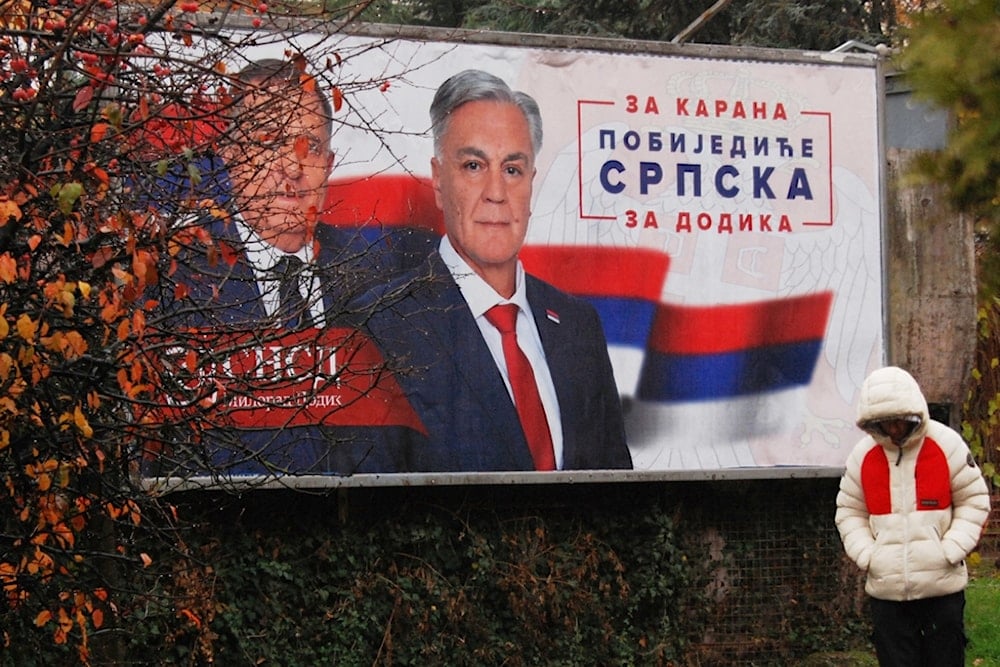Snap election underway in Republika Srpska after removal of Dodik
Republika Srpska is holding a snap presidential election after Milorad Dodik's removal, with six candidates competing in a vote seen as a key test of his enduring influence.
-

A man walks past an election billboard showing Bosnian Serb leader Milorad Dodik, and SNSD party's candidate Sinisa Karan, reading: "For Karan, Republic of Srpska will win, For Dodik.", two days before early presidential elections in the Bosnian town of Banja Luka, Friday, November 21, 2025. (AP Photo/Radivoje Pavicic)
Republika Srpska (RS), the Serb-majority entity of Bosnia and Herzegovina, opened polls on Sunday for a snap presidential election triggered by the dismissal of Milorad Dodik.
Voting began at 7:00 am local time (0600 GMT) across more than 2,200 polling stations in RS and abroad, with over one million registered voters eligible to take part. Polls will close at 7:00 pm (1800 GMT), and the first unofficial results are expected before midnight.
Six candidates are in the running for the presidency. The most prominent contender is Sinisa Karan, the minister of science, technology, and higher education, supported by Dodik’s powerful Union of Independent Social Democrats (SNSD). Analysts say Karan’s campaign is built on maintaining political continuity and keeping the SNSD’s dominance intact.
Opposition figure Branko Blanusa of the Serbian Democratic Party presents the main alternative, promoting a less confrontational course toward state institutions. Also contesting are Dragan Djokanovic (New Policy Union), Nikola Lazarevic (Ecological Party of the RS), and two independent candidates, Igor Gasevic and Slavko Dragicevic.
The outcome is seen as a test of how much influence Dodik still wields after his removal. While officially barred from office, he continues to head the SNSD and remains a central political force in RS.
How the crisis unfolded
The snap election stems from a prolonged institutional standoff between Dodik and Bosnia’s post-war oversight bodies created under the Dayton Peace Agreement. Dodik has repeatedly declared that he does not recognize the Office of the High Representative (OHR) or High Representative Christian Schmidt. At one point, he asserted that he does not recognize the OHR and Schmidt, and went on to say that Republika Srpska would “secede from Bosnia and Herzegovina.”
In June 2023, the RS National Assembly approved measures blocking the publication of OHR decisions in the entity’s Official Gazette. Schmidt, who has the authority to impose or suspend legislation when needed, responded by annulling those acts, warning that RS leaders could face legal consequences for obstructing the peace framework.
Prosecutors subsequently charged Dodik with refusing to implement OHR decisions. In late 2023, he was convicted and sentenced to one year in prison and given a six-year political ban, later converted into a fine. After the verdict, the Central Election Commission unanimously removed him from the RS presidency, which automatically triggered an early election. Bosnia’s Constitutional Court later upheld the ban, clearing the way for the November vote.
Why this vote matters regionally
Even with Dodik out of office, his political network remains intact. A victory for Karan would signal continued alignment with Dodik’s confrontational approach toward Sarajevo and the OHR. A win for the opposition would indicate some appetite for easing tensions, though major structural change is unlikely given SNSD’s dominance at multiple institutional levels.
International actors are watching closely. European institutions insist that Bosnia’s laws and court rulings must be respected. Meanwhile, leaders in Serbia and Hungary have voiced political sympathy for Dodik, framing the actions against him as disproportionate. Western diplomats, however, view the legal decisions as essential for preserving the country’s constitutional order.
Tonight’s results will not only determine the identity of the new RS president but also measure Dodik’s remaining political influence. A decisive SNSD victory would reinforce his power even from outside office, while a closer-than-expected outcome could indicate voter fatigue with repeated institutional confrontations and secessionist rhetoric.
Read more: Vucic tells NATO that Serbia will remain military neutral territory

 4 Min Read
4 Min Read








